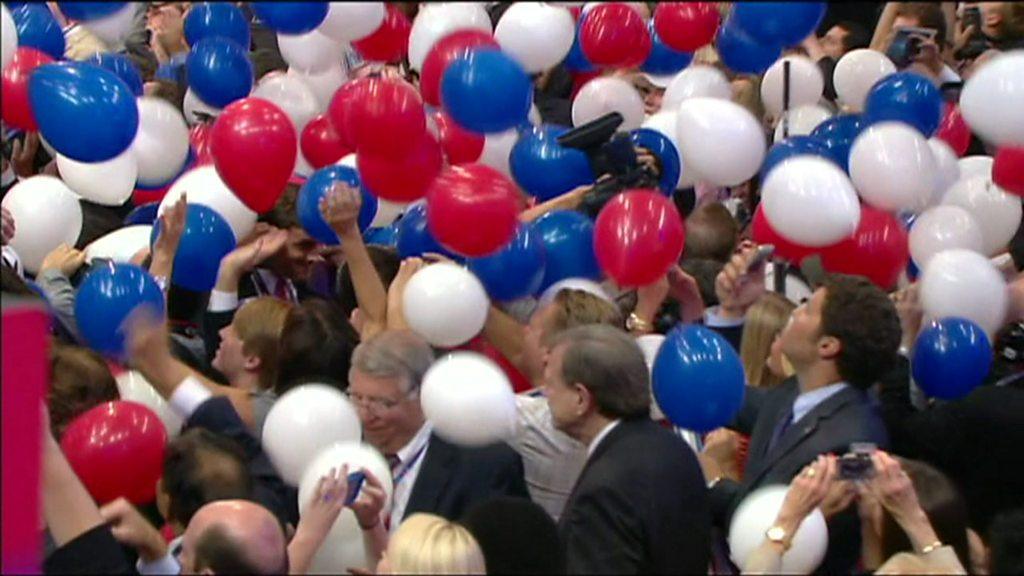Democratic convention schedule: What to watch for at Biden's nomination party
- Published
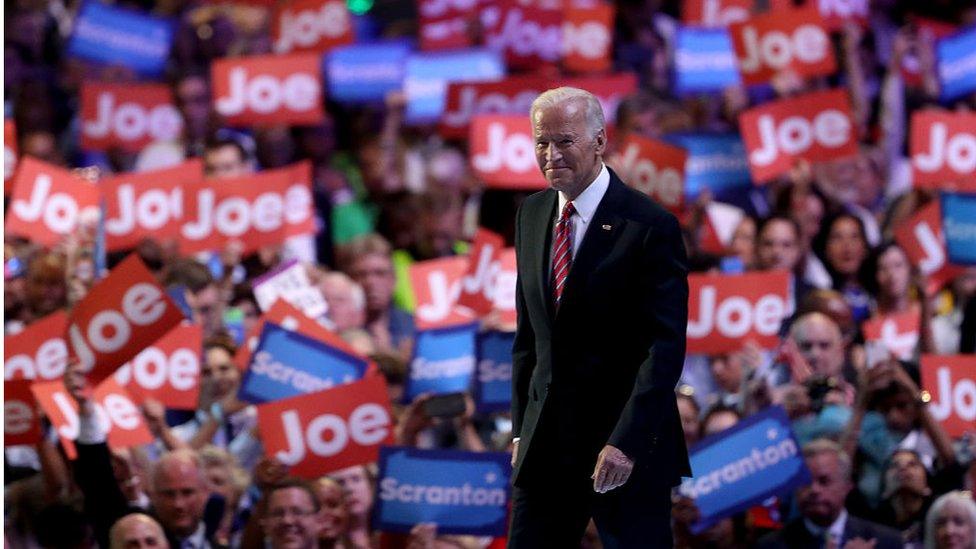
Joe Biden will be the official Democratic nominee once he is formally chosen by party delegates
Balloons. Confetti. Signs. Big hats. It's the moment US election enthusiasts have been waiting four years for. It's convention season.
We've reached the final night of the Democratic National Convention - and Joe Biden has been crowned as the party's presidential nominee.
Of course this year, things are looking a bit different.
Here's everything you need to know about this year's convention, Covid-19 changes and all.
Where and what time is the 2020 convention?
Officially, it's being held in a convention centre in Milwaukee, in the Midwestern state of Wisconsin, from Monday 17 August to Thursday 20 August.
But Covid-19 restrictions and concerns mean that the only people attending in-person are those necessary to orchestrating the event.
Instead of 50,000 people gathering for the traditional calendar with days full of speeches, receptions and rallies, sessions are being streamed from the Democratic Party's social media channels and aired live on most US news channels from 21:00 to 23:00 EDT each night.
Thursday night's jam-packed schedule will include:
A speech from Mr Biden, accepting the party's presidential nomination
Appearances from several ex-2020 contenders, like former New York City mayor Michael Bloomberg, and Pete Buttigieg, mayor of South Bend, Indiana
Speeches from California Governor Gavin Newsom, Atlanta Mayor Keisha Lance Bottoms, and Wisconsin Senator Tammy Duckworth, the first openly-gay woman elected to Congress
Performances by singer John Legend, hip hop star Common, and country pop band The Chicks
What is the Democratic National Convention?
It is where the Democratic Party comes together to formally name - and hype up - their candidates.
You may be thinking, "wasn't Joe Biden already the nominee?"
Yes - and no. Before the convention he was certainly the presumptive Democratic candidate, but it wasn't until the ceremonial roll call on Tuesday that he was officially anointed.
Party members will also unveil the 2020 Democratic platform, the list of party values and policy priorities which they believe distinguish them from their rival Republicans.
What happens at the US conventions?

How to watch the convention
On Thursday evening there will be a live page from 2130 BST/ 1630 EST which you will find on the BBC News front page.
All the latest developments will also be tweeted @BBCNorthAmerica, external while you can see the main speeches and get analysis on BBC World News (global) and the BBC News Channel (UK).
You can also watch the convention on the DNC website, external, from 21:00-23:00 ET (01:00-03:00 GMT the next day).


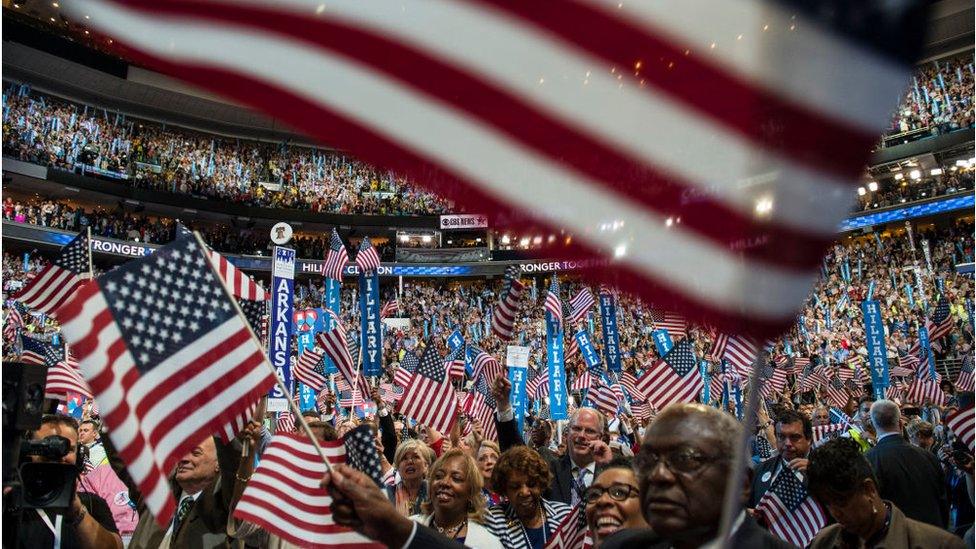
The old normal: A lot of people all in one place, on the final day of the 2016 Democratic convention
Will Joe Biden be there?
Mr Biden will not be in Wisconsin. The presidential nominee will be dialling in from his home state of Delaware, and he'll deliver his speech from the Chase Center, in Wilmington. That's also where Kamala Harris, his vice-presidential pick, gave her acceptance speech on Wednesday.
He's already had appearances on the first two nights though. On Monday he led a recorded conversation on race with politicians and activists, and on Tuesday he joined his wife Jill for her speech.
Who are the speakers this year?
Michelle Obama and Senator Bernie Sanders addressed the virtual crowds on Monday night. Former President Bill Clinton was the headline act on Tuesday.
Who is Kamala Harris, vice-president?
Former president Barack Obama took a primetime slot on Wednesday night, as did Hillary Clinton, Mr Obama's former secretary of state and the Democrats' presidential nominee in 2016.

What to watch out for

This political convention won't look like any we've seen before but the stakes are as high as ever. Here's what I'm looking out for:
Biden as the anti-Trump: First and foremost, this is Joe Biden's moment in the spotlight. He will attack President Trump not only for his policies - which he says have "left the US in tatters" - but for his behaviour in the White House. Biden frames this election as a "fight for the soul of the nation" and will present himself as the candidate who can unite and heal America.
Signs of weakness: There have been doubts, encouraged by his political adversaries, that the 77-year-old has lost a step in recent years. He's traditionally been a compelling public speaker, and Democrats will be hoping he can rise to the moment and put doubts to rest about his endurance and abilities.
An appeal to multiple audiences: Biden will use the convention to appeal to a national audience tuning into the campaign for the first time - especially independents and moderate Republicans - but he also needs to energise the base, including those on the left of the party. Barack Obama was the last Democrat to build a winning coalition - with the former president, and his wife Michelle, closing out two nights, his campaign clearly hopes some of the Obama magic rubs off.
The rising stars: While Biden's choice of Kamala Harris as his running mate has made her an heir apparent, there are other names on the speaking schedule who might someday challenge her. That includes a gaggle of governors, such as New York's Andrew Cuomo and Gavin Newsom of California, five of Biden's 2020 campaign rivals and several members of his vice-presidential short list.
Then there's Congresswoman Alexandria Ocasio-Cortez, who at 30 is still several cycles away from a possible presidential bid but is already a power in the progressive wing of the party. Will any of them follow in the steps of then-state senator Obama in 2004, and seize the moment?

Will it just be politicians speaking?
Not to worry - you'll hear from ordinary, relatable Americans too.
Planners have promised "fewer people behind podiums - and more people in living rooms, on factory floors, at small businesses, and in schools and town squares".
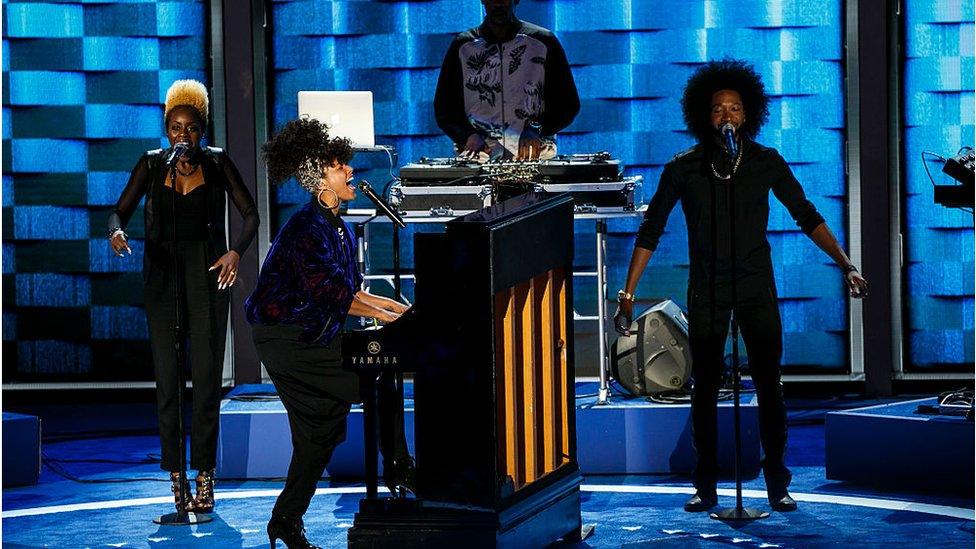
Alicia Keys performed at the 2016 Democratic convention
This line-up includes educators, gun safety advocates, healthcare workers and even some former Republicans.
We've heard from a Pennsylvania farmer, Rick Telesz, who voted for Trump in 2016, but changed his mind after his family farm suffered amid the president's trade war.
Another highlighted voice this year is gun safety advocate DeAndra Dycus, an Indiana mother whose 13-year-old son was shot and injured at a birthday party.
Why are Republicans on the bill?
It's rare, though not unprecedented, to have members of the other party show up. This time, former Ohio Governor John Kasich, a Republican and Trump critic, addressed the convention on Monday. Another Republican, former Secretary of State Colin Powell, spoke on Tuesday.
They represent moderate conservatives unhappy with the direction the president has taken the Republican Party.
How is the candidate chosen?
If you've been following along with the primary election season so far, you know why the nomination vote was a formality for Biden.
After a shaky start in the primary elections when each party picks its candidate, he convincingly won the race ahead of Bernie Sanders.
Delegates from across the US formally vote at the convention for the candidate that won their state's Democratic primary election or caucus.
Usually delegates are in the convention hall when they vote, but this year it was what planners described was a "re-imagined roll call process" taking viewers to all 57 states and territories.
As for those delegates who were promised to other candidates who've since withdrawn from the race, they're free to vote as they will.
If you want to know more about the delegate system, you can read about it in our guide to primaries and caucuses.
What happens next?
Don't worry, convention season isn't over yet. We've got the Republican National Convention coming up from August 24-27, though the pandemic has upended plans for that, too.
After that, presidential campaigning will be in full force until the general election on 3 November.
Make a note in your calendars for the debates, too. The first presidential debate is scheduled for 29 September, with two more in October.

The US election process can be confusing. The BBC is here to help make sense of it. Please put your questions below.
Please ensure you have read our terms & conditions and privacy policy.
If you are reading this page and can't see the form you will need to visit the mobile version of the BBC website to submit your question or comment or you can email us at HaveYourSay@bbc.co.uk, external. Please include your name, age and location with any submission.
- Published5 August 2020
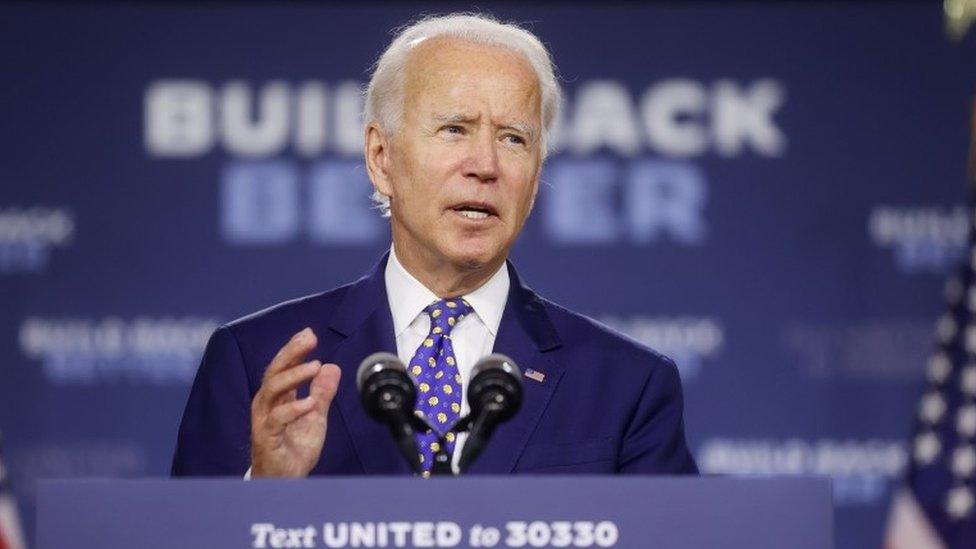
- Published5 March 2020
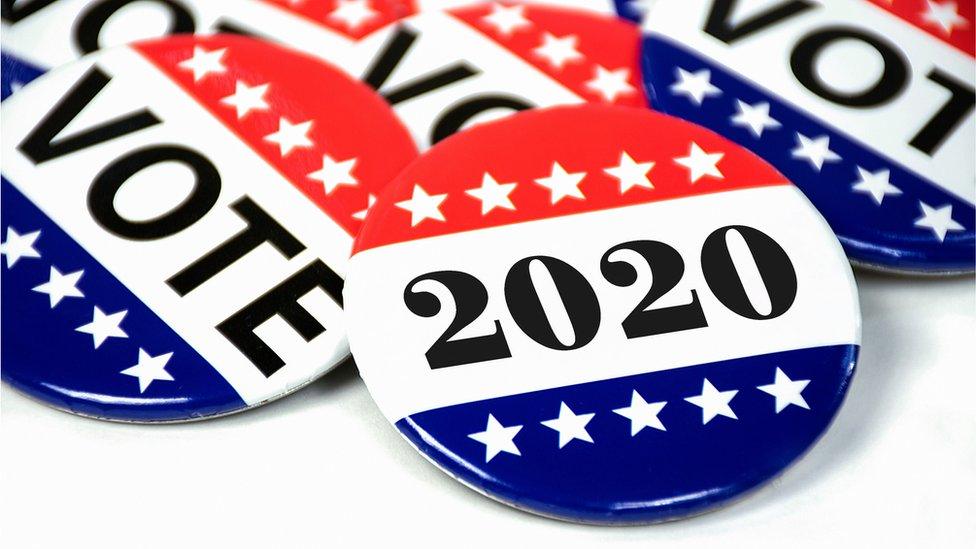
- Published28 July 2016
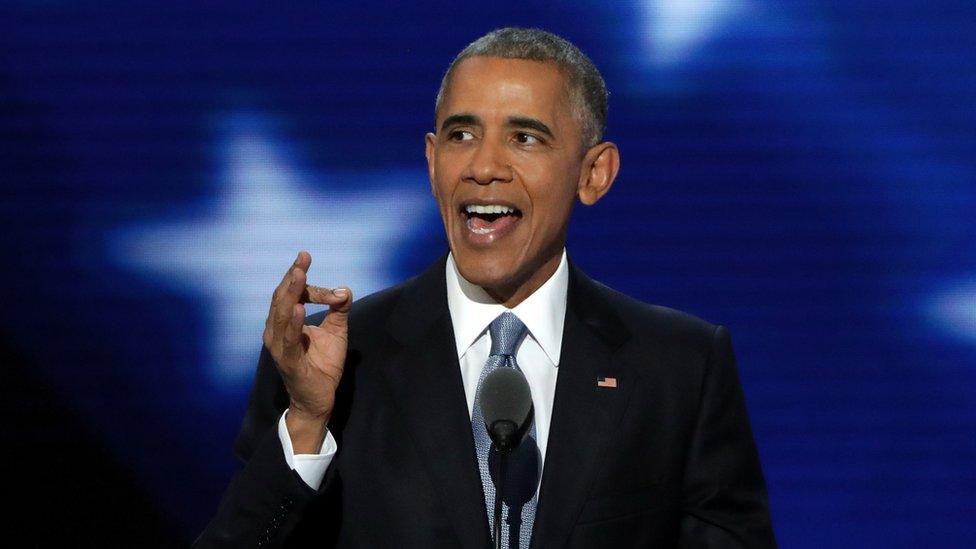
- Published28 July 2016
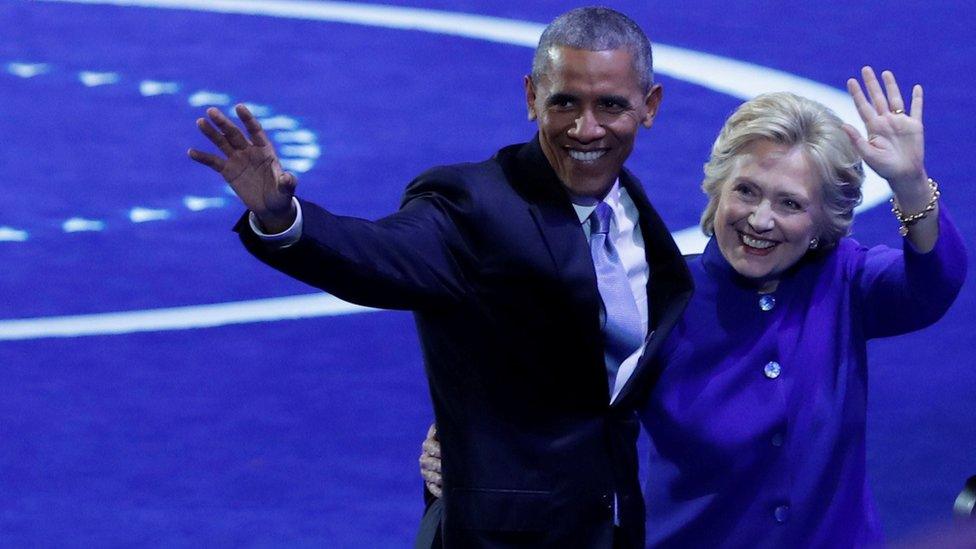
- Published26 July 2016
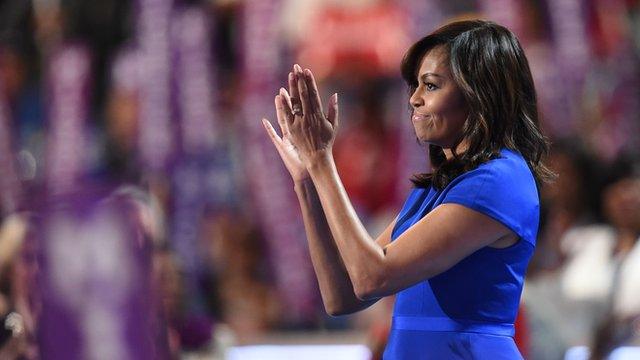
- Published17 July 2016
